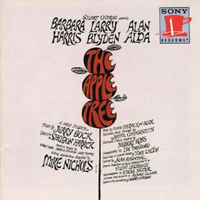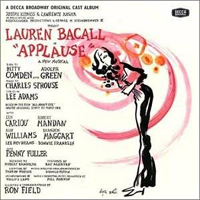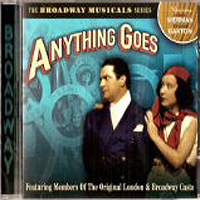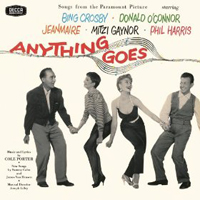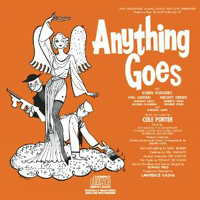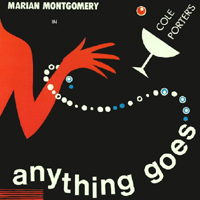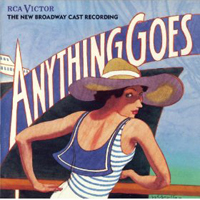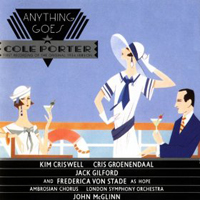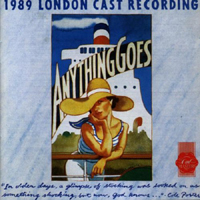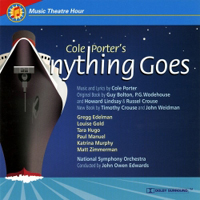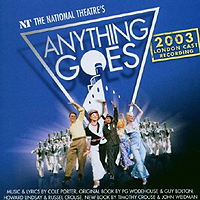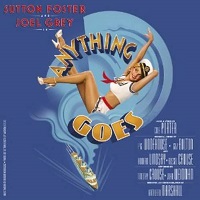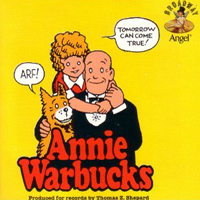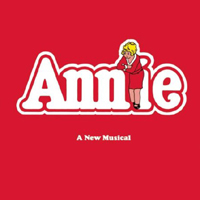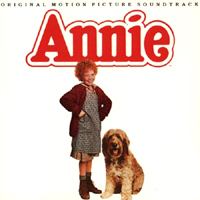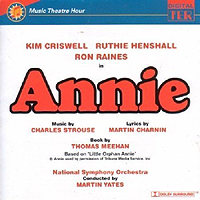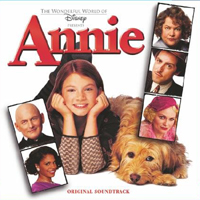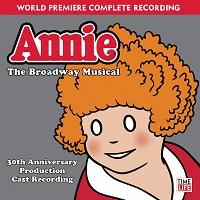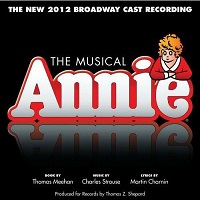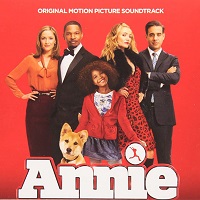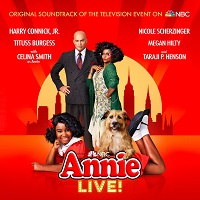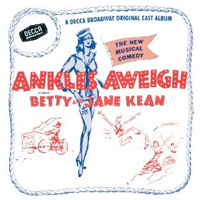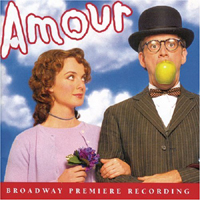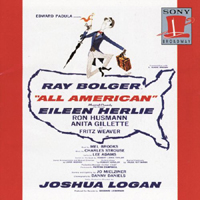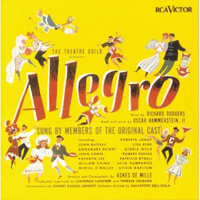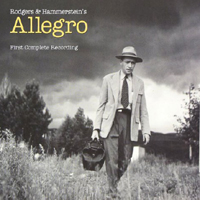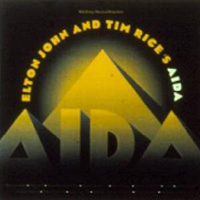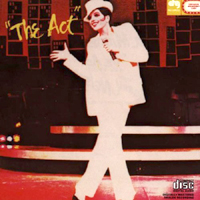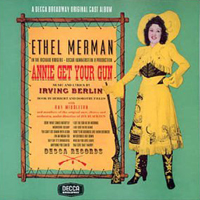 Original Broadway Cast, 1946 (Decca)
Original Broadway Cast, 1946 (Decca)  (3 / 5) When this recording was made, cast albums were still a fairly new concept. It’s a major disappointment that the classic Irving Berlin score for Annie Get Your Gun is presented here as little more than a collection of songs from the show, with little or no attempt to recreate the theatrical experience. Yes, Ethel Merman is on hand to raise her golden voice, and she is at her peak vocally in such brilliant songs as “Doin’ What Comes Natur’lly,” “You Can’t Get a Man With a Gun,” “Moonshine Lullaby,” and “I Got the Sun in the Morning” — but this makes it even more disappointing that she doesn’t really play Annie Oakley on the recording, and instead simply introduces the Berlin songs as potential standards. It’s also unfortunate that a good amount of the show’s music and lyrics were not recorded: There’s no overture, no “Colonel Buffalo Bill,” no “I’m a Bad, Bad Man.” Most unhappily of all, Merman does not sing the anthem “There’s No Business Like Show Business” with other members of the original cast, as she did on stage; rather, the song is given a bland choral rendition. On the plus side, Ray Middleton has a glorious voice that’s perfectly suited to the role of Frank Butler. His performance comes through a bit more theatrically than Merman’s, and he sounds very appealing and even sexy. As wonderful as it is to hear the two original stars singing this score, this album is largely unsatisfying, but it served its purpose until better recordings came along. (See below.) — Gerard Alessandrini
(3 / 5) When this recording was made, cast albums were still a fairly new concept. It’s a major disappointment that the classic Irving Berlin score for Annie Get Your Gun is presented here as little more than a collection of songs from the show, with little or no attempt to recreate the theatrical experience. Yes, Ethel Merman is on hand to raise her golden voice, and she is at her peak vocally in such brilliant songs as “Doin’ What Comes Natur’lly,” “You Can’t Get a Man With a Gun,” “Moonshine Lullaby,” and “I Got the Sun in the Morning” — but this makes it even more disappointing that she doesn’t really play Annie Oakley on the recording, and instead simply introduces the Berlin songs as potential standards. It’s also unfortunate that a good amount of the show’s music and lyrics were not recorded: There’s no overture, no “Colonel Buffalo Bill,” no “I’m a Bad, Bad Man.” Most unhappily of all, Merman does not sing the anthem “There’s No Business Like Show Business” with other members of the original cast, as she did on stage; rather, the song is given a bland choral rendition. On the plus side, Ray Middleton has a glorious voice that’s perfectly suited to the role of Frank Butler. His performance comes through a bit more theatrically than Merman’s, and he sounds very appealing and even sexy. As wonderful as it is to hear the two original stars singing this score, this album is largely unsatisfying, but it served its purpose until better recordings came along. (See below.) — Gerard Alessandrini
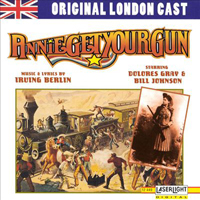 Original London Cast, 1947 (World Records/various CD labels)
Original London Cast, 1947 (World Records/various CD labels)  (1 / 5) This production made a star of Dolores Gray. As recorded here, her unique voice marks her as someone destined for greatness. Gray’s interpretation of Annie Oakley is very different from Ethel Merman’s, but it’s wonderful to hear her sing Berlin’s tuneful songs so smoothly–especially “I Got Lost in His Arms” and other ballads. As Frank Butler, Bill Johnson sounds equally terrific. Issued in four large 78-rpm platters, these recordings are very quaint-sounding, much more so than American cast albums of the same period. Although it’s fun to hear Gray and Johnson, the selections are so brief and the sound quality so fuzzy that this set will only be of interest to historians. — G.A.
(1 / 5) This production made a star of Dolores Gray. As recorded here, her unique voice marks her as someone destined for greatness. Gray’s interpretation of Annie Oakley is very different from Ethel Merman’s, but it’s wonderful to hear her sing Berlin’s tuneful songs so smoothly–especially “I Got Lost in His Arms” and other ballads. As Frank Butler, Bill Johnson sounds equally terrific. Issued in four large 78-rpm platters, these recordings are very quaint-sounding, much more so than American cast albums of the same period. Although it’s fun to hear Gray and Johnson, the selections are so brief and the sound quality so fuzzy that this set will only be of interest to historians. — G.A.
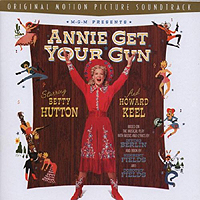 Film Soundtrack, 1950 (MGM/Rhino-Turner)
Film Soundtrack, 1950 (MGM/Rhino-Turner)  (4 / 5) When MGM prepared to film Annie Get Your Gun, the studio pulled out all the stops. The soundtrack recording exemplifies the high standards set for the movie, which raised the bar for screen versions of stage musicals. Great care was taken in expanding the show’s orchestrations and choral parts. Howard Keel was cast as Frank Butler; he had just come to Hollywood via the Broadway and London stages and was still fresh, theatrical, and gorgeous-with a big, bright, melodic baritone to boot. The really questionable aspect of this recording is the performance of Betty Hutton as Annie Oakley. Although she was a huge star in her day, beloved for her rowdy comic style, Hutton never had the vocal range of an Ethel Merman. As a result, Annie’s songs are shortchanged here. But wait! Included as bonus tracks are those songs as sung by the great Judy Garland, who was to have starred in the film. (The reasons for her dismissal are detailed by George Feltenstein, producer of the CD, in his notes on the release.) Garland’s renditions of “They Say It’s Wonderful” (with Keel) and the reprise of “There’s No Business Like Show Business” are spine-tingling. Her comic timing and wit come through sharp and clear in “Doin’ What Comes Natur’lly” and “I Got the Sun in the Morning,” putting Hutton’s over-the-top performances to shame. It’s a safe guess that this generally excellent stage-to-screen transfer would have been one of the best movie musicals of all time if Garland had completed the film. Note that the disc includes both Hutton’s and Garland’s renditions of “Let’s Go West Again,” a song that was apparently written by Irving Berlin for Annie in 1946 but was cut before the show opened. The number was to be reinstated for the film, but never made it, so it’s nice to find it here in two different performances. — G.A.
(4 / 5) When MGM prepared to film Annie Get Your Gun, the studio pulled out all the stops. The soundtrack recording exemplifies the high standards set for the movie, which raised the bar for screen versions of stage musicals. Great care was taken in expanding the show’s orchestrations and choral parts. Howard Keel was cast as Frank Butler; he had just come to Hollywood via the Broadway and London stages and was still fresh, theatrical, and gorgeous-with a big, bright, melodic baritone to boot. The really questionable aspect of this recording is the performance of Betty Hutton as Annie Oakley. Although she was a huge star in her day, beloved for her rowdy comic style, Hutton never had the vocal range of an Ethel Merman. As a result, Annie’s songs are shortchanged here. But wait! Included as bonus tracks are those songs as sung by the great Judy Garland, who was to have starred in the film. (The reasons for her dismissal are detailed by George Feltenstein, producer of the CD, in his notes on the release.) Garland’s renditions of “They Say It’s Wonderful” (with Keel) and the reprise of “There’s No Business Like Show Business” are spine-tingling. Her comic timing and wit come through sharp and clear in “Doin’ What Comes Natur’lly” and “I Got the Sun in the Morning,” putting Hutton’s over-the-top performances to shame. It’s a safe guess that this generally excellent stage-to-screen transfer would have been one of the best movie musicals of all time if Garland had completed the film. Note that the disc includes both Hutton’s and Garland’s renditions of “Let’s Go West Again,” a song that was apparently written by Irving Berlin for Annie in 1946 but was cut before the show opened. The number was to be reinstated for the film, but never made it, so it’s nice to find it here in two different performances. — G.A.
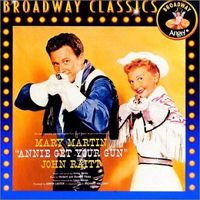 Studio Cast, 1957 (Capitol/Broadway Angel)
Studio Cast, 1957 (Capitol/Broadway Angel)  (2 / 5) Mary Martin and John Raitt were acclaimed for their stage performances in Annie Get Your Gun, but this recording fails to capture the excitement, personality, or vocal artistry of their interpretations. It’s less a cast album than a recording of songs from the show with 1950s pop orchestrations that bear little or no resemblance to the originals and are quite untheatrical — a very strange artistic choice, considering that this score contains the anthem “There’s No Business Like Show Buisness.” Martin and Raitt starred in a fine television production of the musical around the time of this recording, and it’s a shame that Capitol Records didn’t produce a true TV cast album. In the surviving kinescope of the broadcast, the stars are as vibrant and thrilling as any other Annie Oakley or Frank Butler, but the Capitol recording is flat, dry, and altogether forgettable. — G.A.
(2 / 5) Mary Martin and John Raitt were acclaimed for their stage performances in Annie Get Your Gun, but this recording fails to capture the excitement, personality, or vocal artistry of their interpretations. It’s less a cast album than a recording of songs from the show with 1950s pop orchestrations that bear little or no resemblance to the originals and are quite untheatrical — a very strange artistic choice, considering that this score contains the anthem “There’s No Business Like Show Buisness.” Martin and Raitt starred in a fine television production of the musical around the time of this recording, and it’s a shame that Capitol Records didn’t produce a true TV cast album. In the surviving kinescope of the broadcast, the stars are as vibrant and thrilling as any other Annie Oakley or Frank Butler, but the Capitol recording is flat, dry, and altogether forgettable. — G.A.
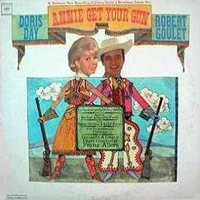 Studio Cast, 1963 (Columbia/no CD) 0 stars; not recommended. This is one of the most disappointing studio cast recordings of any Broadway score. It’s conducted by the great Franz Allers and was produced by Columbia Records, the company responsible for many of the classiest cast albums ever issued. But almost every choice made here was misguided and the result is embarrassing. Doris Day should have been terrific in this role (as she was in the film Calamity Jane), but her performances of Annie Oakley’s songs are sleepy and tepid. As Frank Butler, Robert Goulet probably seemed perfect in theory, but what might have been dream casting is sabotaged by his Vegas-like renditions of songs that require a robust, legit sound. To compound this misuse of talent, there are pallid new orchestrations by the usually reliable Phil Lang. It’s a shame that Day, Goulet, and Allers didn’t offer a more straightforward reading of Irving Berlin’s greatest score. — G.A.
Studio Cast, 1963 (Columbia/no CD) 0 stars; not recommended. This is one of the most disappointing studio cast recordings of any Broadway score. It’s conducted by the great Franz Allers and was produced by Columbia Records, the company responsible for many of the classiest cast albums ever issued. But almost every choice made here was misguided and the result is embarrassing. Doris Day should have been terrific in this role (as she was in the film Calamity Jane), but her performances of Annie Oakley’s songs are sleepy and tepid. As Frank Butler, Robert Goulet probably seemed perfect in theory, but what might have been dream casting is sabotaged by his Vegas-like renditions of songs that require a robust, legit sound. To compound this misuse of talent, there are pallid new orchestrations by the usually reliable Phil Lang. It’s a shame that Day, Goulet, and Allers didn’t offer a more straightforward reading of Irving Berlin’s greatest score. — G.A.
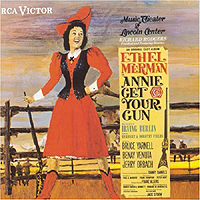 Music Theater of Lincoln Center Cast, 1966 (RCA)
Music Theater of Lincoln Center Cast, 1966 (RCA)  (5 / 5) Here’s the gem, the most enjoyable recording of Annie Get Your Gun. Even though it was made years after the original Decca album, it’s a more accurate representation of the score as a theatrical experience — and Ethel Merman, two decades after creating the role on Broadway, never sounded fresher. Her vibrato is tight, her pitch perfect, her acting and comic timing impeccable. By 1966, stereophonic recording was at its peak, and the spacious, crisp sound of the recording makes you feel as if you’ve got a front-row seat for the performance. Supporting Merman is Bruce Yarnell, who possessed one of the most thrilling musical theater voices ever. His big baritone is melodic and hearty, and he delivers every wonderful Berlin lyric with absolutely clarity. Also in the cast is Jerry Orbach in the character role of Charlie Davenport; his performance leaps out of the speakers in the opening number, “Colonel Buffalo Bill,” and “There’s No Business Like Show Business.” This Music Theater of Lincoln Center production was also notable for introducing “An Old-Fashioned Wedding,” the last new Irving Berlin song to be performed on Broadway, it’s a terrific contrapuntal duet between Annie and Frank. And this recording was the first to include all of the verses to “You Can’t Get a Man With a Gun.” Masterfully performed by Merman, the number is a laugh-out-loud exercise in lyrical perfection; it’s Berlin at his most witty and playful, and it doesn’t get any better than this. The score is conducted to perfection by the great Franz Allers. — G.A.
(5 / 5) Here’s the gem, the most enjoyable recording of Annie Get Your Gun. Even though it was made years after the original Decca album, it’s a more accurate representation of the score as a theatrical experience — and Ethel Merman, two decades after creating the role on Broadway, never sounded fresher. Her vibrato is tight, her pitch perfect, her acting and comic timing impeccable. By 1966, stereophonic recording was at its peak, and the spacious, crisp sound of the recording makes you feel as if you’ve got a front-row seat for the performance. Supporting Merman is Bruce Yarnell, who possessed one of the most thrilling musical theater voices ever. His big baritone is melodic and hearty, and he delivers every wonderful Berlin lyric with absolutely clarity. Also in the cast is Jerry Orbach in the character role of Charlie Davenport; his performance leaps out of the speakers in the opening number, “Colonel Buffalo Bill,” and “There’s No Business Like Show Business.” This Music Theater of Lincoln Center production was also notable for introducing “An Old-Fashioned Wedding,” the last new Irving Berlin song to be performed on Broadway, it’s a terrific contrapuntal duet between Annie and Frank. And this recording was the first to include all of the verses to “You Can’t Get a Man With a Gun.” Masterfully performed by Merman, the number is a laugh-out-loud exercise in lyrical perfection; it’s Berlin at his most witty and playful, and it doesn’t get any better than this. The score is conducted to perfection by the great Franz Allers. — G.A.
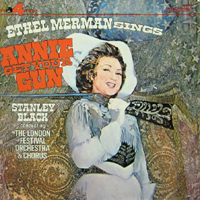 Studio Cast, 1973 (London)
Studio Cast, 1973 (London)  (4 / 5) In the 1960s and ’70s London Records embarked on a high-end series of albums labeled “London Phase 4 Stereo.” The studio performances were recorded on multiple tracks and then mixed down for a ping-pong stereophonic experience. In 1973, Stanley Black conducted Ethel Merman in a new Phase 4 recording of Annie Get Your Gun, and the results were quite phenomenal — the first phenomenon being that Merman was well into her sixties by this time, yet she still sounds fresh and vibrant. Her voice plows right through the waves of super stereo, and in particular, her rendition of “I Got The Sun In The Morning” is the best version she ever recorded. As for the rest of the cast: Nelson Taylor as Frank Butler is as leading-man-baritone-legit as Howard Keel ever was; Neil Howlett, also quite legit sounding, is fine as Charlie Davenport; and Merman’s real life best friend, the wonderful Benay Venuta recreates her original Broadway and film role of Dolly Tate. The orchestrations are expanded and souped up as they might have been for a multi-million-dollar 1960s movie musical, and are quite fun to hear. Even though Stanley Black was primarily a concert and classical conductor, he certainly knows how to deliver a razz-ma-tazz Broadway sound, and here he pulls out the stops. The only real drawback of the album is that the meticulous, hyper-mixed sound keeps it from having a live theatrical presence, but both Merman and composer-lyricist Irving Berlin must have been very happy with this brassy yet classy recording. — G.A.
(4 / 5) In the 1960s and ’70s London Records embarked on a high-end series of albums labeled “London Phase 4 Stereo.” The studio performances were recorded on multiple tracks and then mixed down for a ping-pong stereophonic experience. In 1973, Stanley Black conducted Ethel Merman in a new Phase 4 recording of Annie Get Your Gun, and the results were quite phenomenal — the first phenomenon being that Merman was well into her sixties by this time, yet she still sounds fresh and vibrant. Her voice plows right through the waves of super stereo, and in particular, her rendition of “I Got The Sun In The Morning” is the best version she ever recorded. As for the rest of the cast: Nelson Taylor as Frank Butler is as leading-man-baritone-legit as Howard Keel ever was; Neil Howlett, also quite legit sounding, is fine as Charlie Davenport; and Merman’s real life best friend, the wonderful Benay Venuta recreates her original Broadway and film role of Dolly Tate. The orchestrations are expanded and souped up as they might have been for a multi-million-dollar 1960s movie musical, and are quite fun to hear. Even though Stanley Black was primarily a concert and classical conductor, he certainly knows how to deliver a razz-ma-tazz Broadway sound, and here he pulls out the stops. The only real drawback of the album is that the meticulous, hyper-mixed sound keeps it from having a live theatrical presence, but both Merman and composer-lyricist Irving Berlin must have been very happy with this brassy yet classy recording. — G.A.
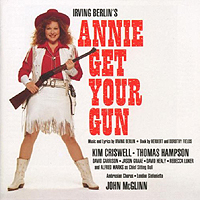 Studio Cast, 1990 (EMI)
Studio Cast, 1990 (EMI)  (2 / 5) John McGlinn, the masterful conductor who created complete digital recordings of such classic shows as Show Boat and Brigadoon, does the same here for Annie Get Your Gun, but much less successfully. The album suffers from less-than-perfect casting and from the decision to use the original score and orchestrations with none of the improvements, cuts, and additions that were made since the show premiered in 1946. (“An Old-Fashioned Wedding” is included as an addendum.) As Annie Oakley, Kim Criswell displays a strong belt voice, but there’s something about her personality that doesn’t quite mesh with the role; she’s sassy, but she’s not the equal of Ethel Merman, Mary Martin, Judy Garland, Judy Kaye, or even (can you believe it?) Betty Hutton. Although Thomas Hampson has the big baritone bravura required for Frank Butler, he’s too operatically trained to pull off the laid-back, cowboy crooner aspects of the part, and he lacks the comic ability to interact effectively with Criswell in “Anything You Can Do.” Jason Graae and Rebecca Luker are fine as Tommy and Winnie, yet this recording makes it clear why these roles are usually eliminated from the show in revival; their songs are somewhat interesting from a historical standpoint, but otherwise negligible. As Charlie Davenport and Colonel Buffalo Bill, respectively, David Garrison and David Healy are well cast but don’t do much to help this album sound particularly theatrical or exciting. — G.A.
(2 / 5) John McGlinn, the masterful conductor who created complete digital recordings of such classic shows as Show Boat and Brigadoon, does the same here for Annie Get Your Gun, but much less successfully. The album suffers from less-than-perfect casting and from the decision to use the original score and orchestrations with none of the improvements, cuts, and additions that were made since the show premiered in 1946. (“An Old-Fashioned Wedding” is included as an addendum.) As Annie Oakley, Kim Criswell displays a strong belt voice, but there’s something about her personality that doesn’t quite mesh with the role; she’s sassy, but she’s not the equal of Ethel Merman, Mary Martin, Judy Garland, Judy Kaye, or even (can you believe it?) Betty Hutton. Although Thomas Hampson has the big baritone bravura required for Frank Butler, he’s too operatically trained to pull off the laid-back, cowboy crooner aspects of the part, and he lacks the comic ability to interact effectively with Criswell in “Anything You Can Do.” Jason Graae and Rebecca Luker are fine as Tommy and Winnie, yet this recording makes it clear why these roles are usually eliminated from the show in revival; their songs are somewhat interesting from a historical standpoint, but otherwise negligible. As Charlie Davenport and Colonel Buffalo Bill, respectively, David Garrison and David Healy are well cast but don’t do much to help this album sound particularly theatrical or exciting. — G.A.
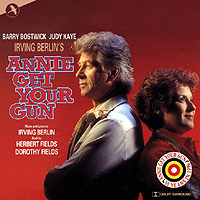 Studio Cast, 1995 (JAY, 2CDs)
Studio Cast, 1995 (JAY, 2CDs)  (5 / 5) This is an excellent, complete recording of the show as revised for the 1966 Lincoln Center production, with its superior orchestrations and the added showstopper “An Old-Fashioned Wedding.” Annie Oakley is played by Judy Kaye at her best. Her voice is melodic and rich, her characterization full of wit and bite. In fact, Kaye is the best Annie on record next to Merman. Barry Bostwick is also well cast as Frank Butler, totally believable as a bragging, hunky cowboy. Robert Russell Bennett’s fine orchestrations are remarkably well conducted by John Owen Edwards; his tempo choices are interesting and fresh, and it’s all the more enjoyable to hear every note of the score in full, clear, digital stereo. — G.A.
(5 / 5) This is an excellent, complete recording of the show as revised for the 1966 Lincoln Center production, with its superior orchestrations and the added showstopper “An Old-Fashioned Wedding.” Annie Oakley is played by Judy Kaye at her best. Her voice is melodic and rich, her characterization full of wit and bite. In fact, Kaye is the best Annie on record next to Merman. Barry Bostwick is also well cast as Frank Butler, totally believable as a bragging, hunky cowboy. Robert Russell Bennett’s fine orchestrations are remarkably well conducted by John Owen Edwards; his tempo choices are interesting and fresh, and it’s all the more enjoyable to hear every note of the score in full, clear, digital stereo. — G.A.
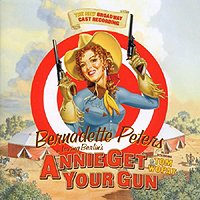 Broadway Cast, 1999 (Broadway Angel)
Broadway Cast, 1999 (Broadway Angel)  (3 / 5) By 1999, much of the content of Annie Get Your Gun seemed politically incorrect, so the show was edited and reinvented. Therefore, this cast recording is not a true interpretation of the musical as originally written. It presents a crisp, new version showcasing Bernadette Peters — a star who, in her own way, is as vibrant and beloved as Merman. Some contemporary listeners may find this revision of the classic score more palatable than what’s heard on earlier recordings, but the orchestrations and some of the vocal performances leave a lot to be desired. Still, the great Irving Berlin songs and the dynamic star performances compensate for those shortcomings. Peters has great range; she handles the comedic lyrics (edited here) hilariously, and delivers the ballads with lots of emotion. Tom Wopat is always an appealing leading man, and his attractive baritone gets a chance to shine here in “The Girl That I Marry” and “My Defenses Are Down.” On the whole, this album is perhaps more successful than the 1999 revival itself; without the drab scenery and questionable book revisions to distract us, the brilliant score is allowed to shine. — G.A.
(3 / 5) By 1999, much of the content of Annie Get Your Gun seemed politically incorrect, so the show was edited and reinvented. Therefore, this cast recording is not a true interpretation of the musical as originally written. It presents a crisp, new version showcasing Bernadette Peters — a star who, in her own way, is as vibrant and beloved as Merman. Some contemporary listeners may find this revision of the classic score more palatable than what’s heard on earlier recordings, but the orchestrations and some of the vocal performances leave a lot to be desired. Still, the great Irving Berlin songs and the dynamic star performances compensate for those shortcomings. Peters has great range; she handles the comedic lyrics (edited here) hilariously, and delivers the ballads with lots of emotion. Tom Wopat is always an appealing leading man, and his attractive baritone gets a chance to shine here in “The Girl That I Marry” and “My Defenses Are Down.” On the whole, this album is perhaps more successful than the 1999 revival itself; without the drab scenery and questionable book revisions to distract us, the brilliant score is allowed to shine. — G.A.
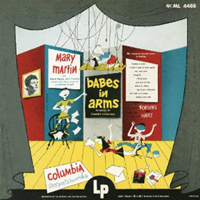 Studio Cast, 1951 (Columbia/Sony)
Studio Cast, 1951 (Columbia/Sony)  (2 / 5) Richard Rodgers and Lorenz Hart’s 1937 classic, the father of all those hey-kids-let’s-put-on-a-show movies with Mickey and Judy, has an expendable book and a gold-plated score: The first song on this recording is “Where or When,” and only a few tracks away are “I Wish I Were in Love Again,” “My Funny Valentine,” and “The Lady Is a Tramp.” While Babes in Arms was a good show to inaugurate Lehman Engel’s studio cast series, this 36-minute sampler LP plays more like “Mary Martin and Friends Sing Songs from Babes in Arms.” Miss M. commandeers most of the hit songs and overworks her adorableness, yet she delivers a spectacular “The Lady Is a Tramp.” Engel’s orchestrations reflect the originals, but they’re heavy on strings and include some obvious effects — whistles in “Johnny One Note,” clip-clops in “Way Out West.” Jack Cassidy leads a stirring performance of the title song, with chorus; he also brings intensity to “You Are So Fair,” but he doesn’t get to do the whole number. And Mardi Bayne, rather than singing both great verses of “Way Out West,” does the first one twice! How nuts is that? — Marc Miller
(2 / 5) Richard Rodgers and Lorenz Hart’s 1937 classic, the father of all those hey-kids-let’s-put-on-a-show movies with Mickey and Judy, has an expendable book and a gold-plated score: The first song on this recording is “Where or When,” and only a few tracks away are “I Wish I Were in Love Again,” “My Funny Valentine,” and “The Lady Is a Tramp.” While Babes in Arms was a good show to inaugurate Lehman Engel’s studio cast series, this 36-minute sampler LP plays more like “Mary Martin and Friends Sing Songs from Babes in Arms.” Miss M. commandeers most of the hit songs and overworks her adorableness, yet she delivers a spectacular “The Lady Is a Tramp.” Engel’s orchestrations reflect the originals, but they’re heavy on strings and include some obvious effects — whistles in “Johnny One Note,” clip-clops in “Way Out West.” Jack Cassidy leads a stirring performance of the title song, with chorus; he also brings intensity to “You Are So Fair,” but he doesn’t get to do the whole number. And Mardi Bayne, rather than singing both great verses of “Way Out West,” does the first one twice! How nuts is that? — Marc Miller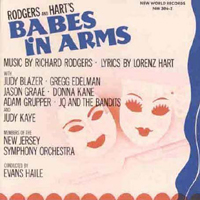 Studio Cast, 1989 (New World)
Studio Cast, 1989 (New World)  (4 / 5) Now, this is more like it: a nearly complete recording with restored Hans Spialek orchestrations, all the ballet music (Babes in Arms was a George Balanchine show), and Evans Haile energetically conducting the New Jersey Symphony Orchestra. All that’s missing is the now-unacceptable “All Dark People,” written by R&H as a specialty for the Nicholas Brothers. Although the ballet music isn’t all that interesting, the orchestrations are terrific, from the pearly celesta in “My Funny Valentine” to the twangs and woodwinds in “Way Out West.” There’s also some spiffy close-harmony work from the guy group JQ and the Bandits. While the casting is vocally deluxe, Judy Blazer, Gregg Edelman, Judy Kaye, and Jason Graae aren’t convincing age-wise as the needy teen offspring of down-on-their-luck vaudevillians. But it would be hard to top Blazer’s reading of “My Funny Valentine,” Kaye’s sarcasm in “Imagine,” or the sheer joy of the title song. It makes you want to go paint a barn, wheel the piano in, and start the auditions! — M.M.
(4 / 5) Now, this is more like it: a nearly complete recording with restored Hans Spialek orchestrations, all the ballet music (Babes in Arms was a George Balanchine show), and Evans Haile energetically conducting the New Jersey Symphony Orchestra. All that’s missing is the now-unacceptable “All Dark People,” written by R&H as a specialty for the Nicholas Brothers. Although the ballet music isn’t all that interesting, the orchestrations are terrific, from the pearly celesta in “My Funny Valentine” to the twangs and woodwinds in “Way Out West.” There’s also some spiffy close-harmony work from the guy group JQ and the Bandits. While the casting is vocally deluxe, Judy Blazer, Gregg Edelman, Judy Kaye, and Jason Graae aren’t convincing age-wise as the needy teen offspring of down-on-their-luck vaudevillians. But it would be hard to top Blazer’s reading of “My Funny Valentine,” Kaye’s sarcasm in “Imagine,” or the sheer joy of the title song. It makes you want to go paint a barn, wheel the piano in, and start the auditions! — M.M.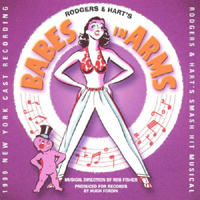 Encores! Concert Cast, 1999 (DRG)
Encores! Concert Cast, 1999 (DRG)  (4 / 5) This is a welcome addition to the musicals-in-concert canon. Surprisingly, it doesn’t surpass the 1989 studio version in terms of theatricality; the lead-in dialogue to the songs merely betrays what a wispy book Babes in Arms has. Rob Fisher’s conducting isn’t as vibrant as that of Evans Haile, but the orchestrations come through with more clarity here. Melissa Rain Anderson is no vocal match for Judy Kaye, nor can Erin Dilly wring nuances from a ballad as Judy Blazer can. But David Campbell is more ingratiating than Gregg Edelman and, in general, this cast is more age-appropriate than the other. The New World album has more ballet music, but this one has “All Dark People” — although it’s listed as “Light on Their Feet,” and only the verse lyrics are included. Which of the two most recent recordings to buy? The New World, 10 minutes longer, is for the archivists; the DRG has a less expert but more persuasively up-and-coming cast. As listening experiences, both are just dandy. — M.M.
(4 / 5) This is a welcome addition to the musicals-in-concert canon. Surprisingly, it doesn’t surpass the 1989 studio version in terms of theatricality; the lead-in dialogue to the songs merely betrays what a wispy book Babes in Arms has. Rob Fisher’s conducting isn’t as vibrant as that of Evans Haile, but the orchestrations come through with more clarity here. Melissa Rain Anderson is no vocal match for Judy Kaye, nor can Erin Dilly wring nuances from a ballad as Judy Blazer can. But David Campbell is more ingratiating than Gregg Edelman and, in general, this cast is more age-appropriate than the other. The New World album has more ballet music, but this one has “All Dark People” — although it’s listed as “Light on Their Feet,” and only the verse lyrics are included. Which of the two most recent recordings to buy? The New World, 10 minutes longer, is for the archivists; the DRG has a less expert but more persuasively up-and-coming cast. As listening experiences, both are just dandy. — M.M.

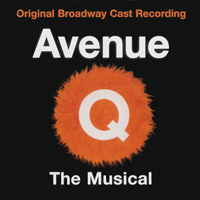
 (5 / 5) What a devilishly clever parody of Sesame Street this Tony Award-winning musical is! Robert Lopez and ]eff Marx’s songs are mostly upbeat and catchy (“Everyone’s a Little Bit Racist”), yet tender when called for (“Fantasies Come True”). The guys have come up with everything from a fast, funky waltz (“My Girlfriend Who Lives in Canada”) to upbeat rock (“Purpose”) to soul (“You Can Be as Loud as the Hell You Want,” which Natalie Venetia Belcon growls perfectly). But there’s also a fine, fine melody line in “There’s a Fine, Fine Line.” The Lopez-Marx lyrics are often monosyllabically simple, which they should be for a kid’s-show spoof, yet they can also be wildly funny and raunchy. Talent-wise, along with librettist Jeff Whitty, are Lopez and Marx the real turtle soup (or merely the mock)? To quote their own creation, Lucy T. Slut: “Yeah, they’re real.” By the time you reach “Mix Tape” — a masterstroke of a song in which one puppet infers that another likes her from the songs that he’s selected and recorded on a cassette for her — you’ll realize that you don’t want a mix tape of songs from different shows, you just want the Avenue Q CD, which showcases the superbly talented ensemble cast of John Tartaglia, Stephanie D’Abruzzo, Rick Lyon, Jennifer Barnhart, Ann Harada, and Jordan Gelber, along with the aforementioned Belcon. — Peter Filichia
(5 / 5) What a devilishly clever parody of Sesame Street this Tony Award-winning musical is! Robert Lopez and ]eff Marx’s songs are mostly upbeat and catchy (“Everyone’s a Little Bit Racist”), yet tender when called for (“Fantasies Come True”). The guys have come up with everything from a fast, funky waltz (“My Girlfriend Who Lives in Canada”) to upbeat rock (“Purpose”) to soul (“You Can Be as Loud as the Hell You Want,” which Natalie Venetia Belcon growls perfectly). But there’s also a fine, fine melody line in “There’s a Fine, Fine Line.” The Lopez-Marx lyrics are often monosyllabically simple, which they should be for a kid’s-show spoof, yet they can also be wildly funny and raunchy. Talent-wise, along with librettist Jeff Whitty, are Lopez and Marx the real turtle soup (or merely the mock)? To quote their own creation, Lucy T. Slut: “Yeah, they’re real.” By the time you reach “Mix Tape” — a masterstroke of a song in which one puppet infers that another likes her from the songs that he’s selected and recorded on a cassette for her — you’ll realize that you don’t want a mix tape of songs from different shows, you just want the Avenue Q CD, which showcases the superbly talented ensemble cast of John Tartaglia, Stephanie D’Abruzzo, Rick Lyon, Jennifer Barnhart, Ann Harada, and Jordan Gelber, along with the aforementioned Belcon. — Peter Filichia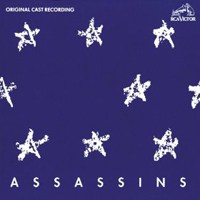
 (3 / 5) There’s no doubt that Stephen Sondheim’s scores are brilliant. His lyrics are innovative; he’s the master of intellectual argument in rhyme. His best melodies, though often overshadowed by acclaim for his superb wordsmithing, are slyly inventive. Yet when the messages in his musicals are examined, they sometimes turn out to be less than the sum of the sung parts. So it is with this revue, written in collaboration with librettist John Weidman, which trots out a bevy of men and women who shot at, and in some instances killed, U.S. presidents. Sondheim and Weidman suggest that, for many unfortunate citizens, the American Dream is a nightmare. Accordingly, they set forth a series of songs — some portentous, some ironically lighthearted — to show how a sense of disenfranchisement can lead to assassination. Sondheim’s pastiche score is jaunty. Weidman’s sketches aren’t included in their entirely on this recording, with the exception of the attenuated Lee Harvey Oswald sequence, wherein John Kennedy’s murderer is visited in his Texas Book Depository hideout by the spirits of assassins past and future. (The idea is that Oswald acted as a representative of a continuing, perhaps inevitable tradition.) The cast assembled to play this group of history’s outcasts includes some of the best musical theater performers of the time, although only Victor Garber as John Wilkes Booth really gets to shine. Among the others warbling and emoting are Annie Golden, Jonathan Hadary, Patrick Cassidy, Eddie Korbich, William Parry, Terrence Mann, Lee Wilkof, and Debra Monk. — David Finkle
(3 / 5) There’s no doubt that Stephen Sondheim’s scores are brilliant. His lyrics are innovative; he’s the master of intellectual argument in rhyme. His best melodies, though often overshadowed by acclaim for his superb wordsmithing, are slyly inventive. Yet when the messages in his musicals are examined, they sometimes turn out to be less than the sum of the sung parts. So it is with this revue, written in collaboration with librettist John Weidman, which trots out a bevy of men and women who shot at, and in some instances killed, U.S. presidents. Sondheim and Weidman suggest that, for many unfortunate citizens, the American Dream is a nightmare. Accordingly, they set forth a series of songs — some portentous, some ironically lighthearted — to show how a sense of disenfranchisement can lead to assassination. Sondheim’s pastiche score is jaunty. Weidman’s sketches aren’t included in their entirely on this recording, with the exception of the attenuated Lee Harvey Oswald sequence, wherein John Kennedy’s murderer is visited in his Texas Book Depository hideout by the spirits of assassins past and future. (The idea is that Oswald acted as a representative of a continuing, perhaps inevitable tradition.) The cast assembled to play this group of history’s outcasts includes some of the best musical theater performers of the time, although only Victor Garber as John Wilkes Booth really gets to shine. Among the others warbling and emoting are Annie Golden, Jonathan Hadary, Patrick Cassidy, Eddie Korbich, William Parry, Terrence Mann, Lee Wilkof, and Debra Monk. — David Finkle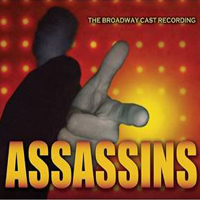
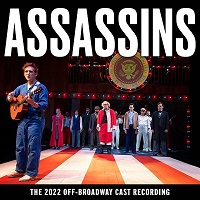
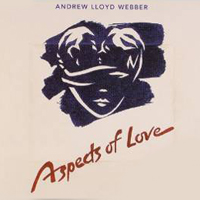
 (1 / 5) Beyond being one of Andrew Lloyd Webber’s most inscrutable shows, Aspects of Love is also one of his most ridiculous — more soap opera than pop opera. Though the show’s story doesn’t diverge much from the 1955 David Garnett novella on which it’s based, you may wish it did when listening to this almost complete recording (only a few bits are missing). The endlessly foolish romantic machinations of the characters are not made more palatable by the performances of the leads, Ann Crumb and Michael Ball; they serve the score well, but they can’t do much to make their sex-obsessed characters ingratiating or sympathetic. Kevin Colson, Kathleen Rowe Martin, and Diana Morrison, who have supporting roles in this game of musical beds, come across better. With lyrics by Don Black and Charles Hart, some of the score is attractive, and musical director Michael Reed gets rich results from the orchestra, but the performers’ emoting is so overwrought that suffering through the whole thing for the sake of a few good songs is exhausting. The recording is worthwhile for “Love Changes Everything,” “Seeing Is Believing,” “The First Man You Remember,” and “Anything but Lonely,” but not for the sort of plot twists and relationship games that even daytime television might reject. — Matthew Murray
(1 / 5) Beyond being one of Andrew Lloyd Webber’s most inscrutable shows, Aspects of Love is also one of his most ridiculous — more soap opera than pop opera. Though the show’s story doesn’t diverge much from the 1955 David Garnett novella on which it’s based, you may wish it did when listening to this almost complete recording (only a few bits are missing). The endlessly foolish romantic machinations of the characters are not made more palatable by the performances of the leads, Ann Crumb and Michael Ball; they serve the score well, but they can’t do much to make their sex-obsessed characters ingratiating or sympathetic. Kevin Colson, Kathleen Rowe Martin, and Diana Morrison, who have supporting roles in this game of musical beds, come across better. With lyrics by Don Black and Charles Hart, some of the score is attractive, and musical director Michael Reed gets rich results from the orchestra, but the performers’ emoting is so overwrought that suffering through the whole thing for the sake of a few good songs is exhausting. The recording is worthwhile for “Love Changes Everything,” “Seeing Is Believing,” “The First Man You Remember,” and “Anything but Lonely,” but not for the sort of plot twists and relationship games that even daytime television might reject. — Matthew Murray